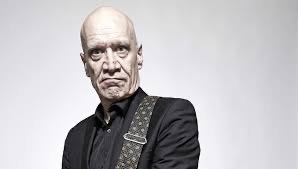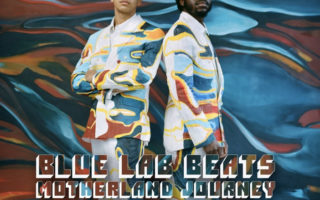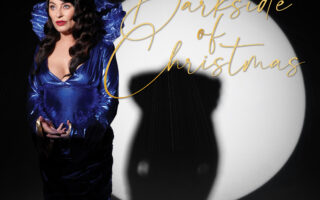Wilko Johnson/Norman Watt-Roy/Dylan Howe with John Otway
The Apex, Bury St Edmunds, was the setting for this, one of the first nights of an extensive tour Wilko Johnson and his band is undertaking – the return to normality after Covid tour. It was the first concert for over two years I had been where masks and social distancing didn’t feature, though both were a personal choice. I have to admit I was there mainly to see Norman Watt-Roy because, being a long-time follower of his playing, I knew quality bass playing was guaranteed. The plan was to go for a couple of John Otway numbers, take time out for a drink, chat and socialise and then go back in for the second set with Wilko and co. I have reviewed Wilko and Dylan Howe, so was looking forward to hearing them.
However, things didn’t go to plan. John Otway was stand-out. He delivers an energetic, comedy-laced set with self-effacing aplenty, yet interwoven is a substantial musical content of different styles, including several self-penned songs – two of which were hits, (he reminded us several times), although 25 years apart. He played an odd-shaped double guitar on one track – invented, he explained, because he learned violin right-handed so he can work the strings with left or right hand (he is left-handed).
He was supported by his ‘roadie’ he calls Deadly, who acts as the straight guy of this intriguing double act and introduces wonderfully timed reactions to Otway’s comments and portrays just the right combination of wounded employee and secretly talented musician.
It would give too much away to go into description here but suffice to say; I would happily go and see Otway perform again.
Then it was Wilko, Norman, and Dylan, and the crowd was in for a treat. Johnson is a man of few words, but he does not need them – his interaction using guitar and movement makes words redundant. Instead, he engages with the audience by machine-gunning them with blasts from his Telecaster guitar, giving them manic stares and regularly crossing the stage in rapid ‘duck walk’ to momentarily take centre stage instead of his regular right-hand standing, or play alongside Norman Watt Roy. He also possesses a smile that could melt the darkest of hearts. Watt-Roy, meanwhile, was wholly attuned to both Johnson’s guitar and his own playing. Head down, deeply in the music, Watt-Roy proved why he remains one of the county’s most beloved bass players. Offering steadfast support, yet lifting to amazing solo work at times, Watt-Roy was playing out of his skin. His vocals were good too.
Dylan Howe, on drums, kept the momentum and added wonderful touches to the spaces at times. His extended solo was one of the best I have heard this year, and Johnson allowed him grace to add additional bars of flourishes, as he was, simply on a roll.
The performance had the sense of still coming together, the decades-long partnership between Johnson and Watt-Roy showing an almost uncanny communication at times between the players. There were one or two numbers where the harmonies were a little out of synch, and Johnson was flat, but who the heck cares at the end of the day? It was fun, slick in places, and if there was at times a sense of the same rhythms being worked at different speeds in each number, well, does it matter? It made people, including me, very happy. It was wonderful to hear songs from the 1970s and 80s, as well as more recent numbers – such as songs from the 2014 album Johnson made with Roger Daltrey, called Going Back Home, which I reviewed and contains some well-crafted numbers such as Just 21 and ‘ I Keep It To Myself.
Johnson, of course, was associated with R&B/rock group Dr. Feelgood in the 1970s but has achieved many things since he and the rest of the band parted company in 1977. He played with The Blockheads, where he found himself at the centre of some hearty disagreements, and his affable, sensible nature, as well as his own experience of leaving a band, meant he could give good advice.
I remember sitting in a friend’s sitting room one Boxing Day a few years back and the ex-manager of several bands explained to me about Johnson’s illness and how serious it was (I won’t go over the details again here) but considering how close the circuit came to losing one of its favourite musicians and the success he has had since that period, Johnson is something of a wonder in many ways.
Despite his affable nature and few words, Johnson has a presence on stage, and makes playing the guitar look like a walk in the park. His voice is stronger than I expected form recordings, and his playing is distinctive and technically superb. At one point he slung his guitar across his back, playing it blind – which resulted in some quick re-aligning of the strap afterward.
Johnson’s energy is matched by that of Watt-Roy’s and Howe’s, and each proved at different points why they form such a great combination under Johnson’s gentle leadership. He is aware of their prowess and affords them generous moments in the spotlight, evidently aware of the joy they bring to the audience.
Johnson has played most of the numbers for decades, apart from one or two more recently penned ones, and you get a sense he could play most of them in his sleep, and partly, this is the point. Yes, they are familiar, but these musicians are savvy and experienced enough never to play them the same – they introduce subtleties and changes which keep the audience engaged. The whole experience is intense, fun, and – always the sign of a good gig- over far too soon.




